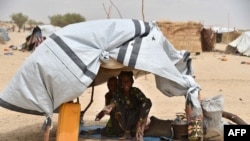Two weeks after an attack by the Islamist group Boko Haram left at least 30 people dead, the border community of Bosso, in Niger, has become a ghost town. Most of its population left and the area remains at risk to violence.
A shoe, a half-full suitcase strewn in the backyard, the house doors left open… Most residents of Bosso left everything behind two weeks ago when the first gunshots rang through the town.
Among them is El Hajj Abba.
"Yes, we are scared. We don’t have weapons, so it’s normal to be scared," he said as he stood on top of his car, strapping a pile of belongings he can bring to the IDP camp where he and his family now stay.
Abba is Nigerian. He fled to Bosso, in Niger, after Boko Haram militants wreaked havoc in his home country, only a few miles away. But the armed group has been attacking several neighboring towns in Niger as well, in the past couple of years, forcing populations to move back and forth between towns and makeshift camps located in the bush.
It’s not the first time that Bosso has been targeted. The most recent attack was on June 3. It was a Friday, just after 8 p.m., remembers resident Abdelaziz Zembada, who lived next to a police station that was targeted.
"I took one of my kids, my wife took two," he said. "By the time we put them to safety and came back to fetch my daughter, a mortar hit my house. My neighbor’s children and my daughter were killed."
Officially, there were no civilians killed during the attack, only soldiers. But some bodies can still be found inside houses and the smell of death is everywhere.
Most of Bosso's estimated 25,000 residents left town. Two thirds were refugees and internally displaced persons. Alarmed residents in the general area also left their homes, leaving an estimated 50,000 people displaced.
On a deserted market street, the decomposing body of a goat dries under the scorching sun, next to a ransacked stall. There is no water, no electricity or phone network, and very little food left in town after Boko Haram looted most of it.
But despite all that, resident Souleyman Salissa decided to stay.
"We can tell it’s going better," he said. "Yesterday, we heard gunshot, but we were not worried."
Salissa says the heavy military presence reassured him. And, as a hairdresser, they are his only customers.
"There are not a lot of people left. It’s disheartening, he said. "We would like more residents to come back, and we need assistance with food, water and electricity."
That day, an official delegation led by Interior Minister Mohamed Bazoum visited the town for the first time since the attack and organized a meeting to reassure the population.
He said the soldiers were there in substantial number and with a new strategy and renewed morale. All conditions are met for the population to feel safe and come back, he said.
But this will take time, as the Islamist group continues attacks along the border, terrorizing the population and harassing authorities. The day before, they attacked and looted a police station in a border town just moments after an official delegation had driven away.







